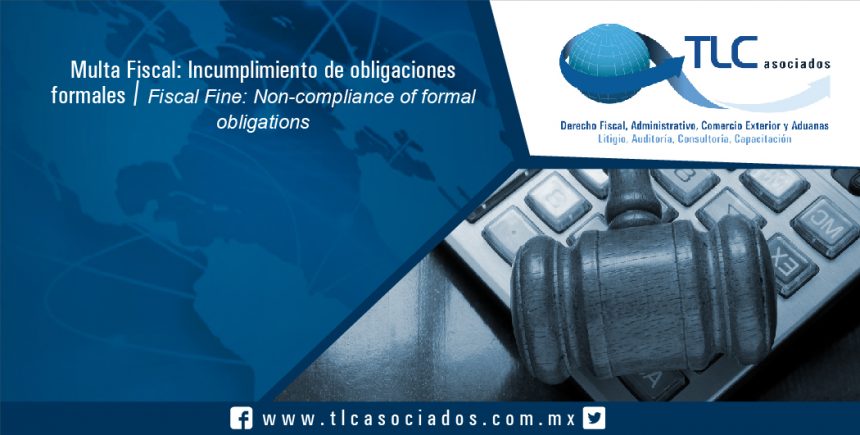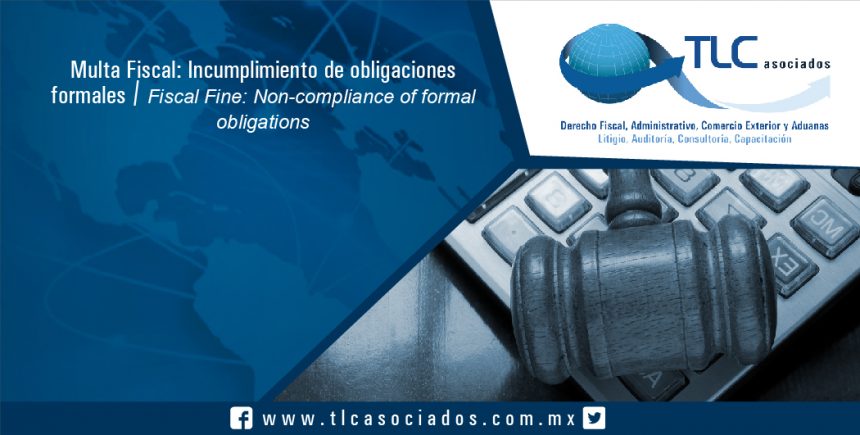
077 – Multa Fiscal: Incumplimiento de obligaciones formales / Fiscal Fine: Non-compliance of formal obligations
Ciudad de México, Abril 2017.
El incumplimiento de alguna obligación en materia fiscal puede derivar en la imposición de varias sanciones, como puede ser la determinación de una multa, una sanción administrativa o en ocasiones la sanción puede implicar cárcel para el contribuyente.
Ello es así, pues la acción u omisión en que incurre el gobernado puede infringir diversas disposiciones fiscales, y por ello puede corresponder una diversidad de sanciones; sin embargo, la decisión de la autoridad se encuentra condicionada a respetar las reglas que al efecto establece el artículo 75 del Código Fiscal de la Federación, específicamente la contenida en el primer párrafo de la fracción V, consistente en que cuando por un acto u omisión se infrinjan diversas disposiciones a las que correspondan varias multas, sólo se aplicará la multa mayor, aunque las infracciones dimanen de disposiciones contenidas en distintos ordenamientos legales, pues en la disposición mencionada se recoge el principio de consunción, por el que se aplica solamente la sanción más grave, lo que tiende a evitar excesos en la represión, cuya base primaria se encuentra en el artículo 23 de la Constitución Política de los Estados Unidos Mexicanos, ya que el infractor no debe ser sancionado dos o más veces por la misma conducta (acción u omisión).
El anterior criterio es asumido por el Tribunal Federal de Justicia Administrativa en la reciente tesis cuyo rubro es: “MULTA POR INFRACCIÓN A DISPOSICIONES FISCALES.- SUPUESTOS EN LOS QUE PROCEDE LA APLICACIÓN DEL BENEFICIO DEL ARTÍCULO 75, FRACCIÓN V, DEL CÓDIGO FISCAL DE LA FEDERACIÓN, A PARTIR DEL TEXTO PUBLICADO EL CINCO DE ENERO DE DOS MIL CUATRO EN EL DIARIO OFICIAL DE LA FEDERACIÓN”, donde concluye que cuando por un acto o una omisión se infrinjan diversas disposiciones fiscales de carácter formal a las que correspondan varias multas, sólo se aplicará la que corresponda a la infracción cuya multa sea mayor.
Beneficio que aún y cuando deriva de lo previsto en el mencionado Código Fiscal de la Federación, en ocasiones es omitido por la autoridad fiscal e impone al contribuyente numerosas y cuantiosas multas; situación por la cual es recomendable que en aquellas ocasiones en que se notifique al gobernado una resolución en que se determinen multas, sea verificado que se cumple con el mencionado principio de “consunción”.
Sin otro asunto en particular quedamos a sus órdenes para cualquier duda o aclaración respecto de la presente información.
Atentamente
División Legal
TLC Asociados, S.C.
tlcnegocios@www.tlcasociados.com.mx
Prohibida la reproducción parcial o total. Todos los derechos reservados de TLC Asociados, S.C. El contenido del presente artículo no constituye una consulta particular y por lo tanto TLC Asociados, S.C., su equipo y su autor, no asumen responsabilidad alguna de la interpretación o aplicación que el lector o destinatario le pueda dar.
April 2017 in Mexico City.
The unfulfillment of any obligation in the fiscal are could result in the imposition of many sanctions, as could be the determination of a fine, an administrative sanction, or in occasions, the sanction could implicate jail time for the taxpayer.
This happens because the action or omission in which the taxpayer incurs could violate many fiscal dispositions, and therefore, it could result in a diversity of sanctions; however, the decision of the authority is conditioned to respect the rules that for that purpose establishes the article 75 of the Fiscal Code of the Federation, specifically the one contained in the first paragraph, section V, consisting in only applying the greatest fine when for one action or omission, many provisions with different fines are violated, even when the infractions emanate from different legal dispositions, since in the mentioned disposition the principle of consumption is reflected, for which only the greatest sanction is applied avoiding excesses in the repression whose main base is found in the article 23 of the Political Constitution of the United Mexican States because the offender must not be sanctioned two or more times for the same conduct (action or omission).
The criteria above is taken on by the Federal Tribunal of Administrative Justice in the thesis named: “FINE DUE TO AN INFRACTION TO FISCAL DISPOSITIONS.- CASES IN WHICH THE IMPLEMENTATION OF THE ARTICLE’S 75 BENEFIT, SECTION V, OF THE FISCAL CODE OF THE FEDERATION PROCEEDS, FROM THE TEXT PUBLISHED ON THE FIFTH OF JANUARY TWO THOUSAND AND FOUR IN THE OFFICIAL JOURNAL OF THE FEDERATION”, where the Tribunal concludes that when for one action or one omission, many fiscal dispositions of formal character are violated to which different penalties correspond, only the highest fine will be applied.
This benefit, even when it results from the mentioned Fiscal Code of the Federation, in occasions is ignored by the tax authority and imposes to the taxpayer numerous and significant fines; situation for which is recommended to review the fulfillment of the principle of consumption indicated in the resolutions where fines are determined notified to the governed party.
Without anything else at this moment, do not hesitate to contact us.
Sincerely,
Legal Division
TLC Asociados, S.C.
tlcnegocios@www.tlcasociados.com.mx
Partial or total reproduction is prohibited. All rights reserved to TLC Asociados, S.C. The content of this article is not a private consultation, therefore, TLC Asociados, S.C., and its team and author, are not responsible for any interpretation or use that the reader or recipient could give to it.

077 – Multa Fiscal: Incumplimiento de obligaciones formales / Fiscal Fine: Non-compliance of formal obligations
Ciudad de México, Abril 2017.
El incumplimiento de alguna obligación en materia fiscal puede derivar en la imposición de varias sanciones, como puede ser la determinación de una multa, una sanción administrativa o en ocasiones la sanción puede implicar cárcel para el contribuyente.
Ello es así, pues la acción u omisión en que incurre el gobernado puede infringir diversas disposiciones fiscales, y por ello puede corresponder una diversidad de sanciones; sin embargo, la decisión de la autoridad se encuentra condicionada a respetar las reglas que al efecto establece el artículo 75 del Código Fiscal de la Federación, específicamente la contenida en el primer párrafo de la fracción V, consistente en que cuando por un acto u omisión se infrinjan diversas disposiciones a las que correspondan varias multas, sólo se aplicará la multa mayor, aunque las infracciones dimanen de disposiciones contenidas en distintos ordenamientos legales, pues en la disposición mencionada se recoge el principio de consunción, por el que se aplica solamente la sanción más grave, lo que tiende a evitar excesos en la represión, cuya base primaria se encuentra en el artículo 23 de la Constitución Política de los Estados Unidos Mexicanos, ya que el infractor no debe ser sancionado dos o más veces por la misma conducta (acción u omisión).
El anterior criterio es asumido por el Tribunal Federal de Justicia Administrativa en la reciente tesis cuyo rubro es: “MULTA POR INFRACCIÓN A DISPOSICIONES FISCALES.- SUPUESTOS EN LOS QUE PROCEDE LA APLICACIÓN DEL BENEFICIO DEL ARTÍCULO 75, FRACCIÓN V, DEL CÓDIGO FISCAL DE LA FEDERACIÓN, A PARTIR DEL TEXTO PUBLICADO EL CINCO DE ENERO DE DOS MIL CUATRO EN EL DIARIO OFICIAL DE LA FEDERACIÓN”, donde concluye que cuando por un acto o una omisión se infrinjan diversas disposiciones fiscales de carácter formal a las que correspondan varias multas, sólo se aplicará la que corresponda a la infracción cuya multa sea mayor.
Beneficio que aún y cuando deriva de lo previsto en el mencionado Código Fiscal de la Federación, en ocasiones es omitido por la autoridad fiscal e impone al contribuyente numerosas y cuantiosas multas; situación por la cual es recomendable que en aquellas ocasiones en que se notifique al gobernado una resolución en que se determinen multas, sea verificado que se cumple con el mencionado principio de “consunción”.
Sin otro asunto en particular quedamos a sus órdenes para cualquier duda o aclaración respecto de la presente información.
Atentamente
División Legal
TLC Asociados, S.C.
tlcnegocios@www.tlcasociados.com.mx
Prohibida la reproducción parcial o total. Todos los derechos reservados de TLC Asociados, S.C. El contenido del presente artículo no constituye una consulta particular y por lo tanto TLC Asociados, S.C., su equipo y su autor, no asumen responsabilidad alguna de la interpretación o aplicación que el lector o destinatario le pueda dar.
April 2017 in Mexico City.
The unfulfillment of any obligation in the fiscal are could result in the imposition of many sanctions, as could be the determination of a fine, an administrative sanction, or in occasions, the sanction could implicate jail time for the taxpayer.
This happens because the action or omission in which the taxpayer incurs could violate many fiscal dispositions, and therefore, it could result in a diversity of sanctions; however, the decision of the authority is conditioned to respect the rules that for that purpose establishes the article 75 of the Fiscal Code of the Federation, specifically the one contained in the first paragraph, section V, consisting in only applying the greatest fine when for one action or omission, many provisions with different fines are violated, even when the infractions emanate from different legal dispositions, since in the mentioned disposition the principle of consumption is reflected, for which only the greatest sanction is applied avoiding excesses in the repression whose main base is found in the article 23 of the Political Constitution of the United Mexican States because the offender must not be sanctioned two or more times for the same conduct (action or omission).
The criteria above is taken on by the Federal Tribunal of Administrative Justice in the thesis named: “FINE DUE TO AN INFRACTION TO FISCAL DISPOSITIONS.- CASES IN WHICH THE IMPLEMENTATION OF THE ARTICLE’S 75 BENEFIT, SECTION V, OF THE FISCAL CODE OF THE FEDERATION PROCEEDS, FROM THE TEXT PUBLISHED ON THE FIFTH OF JANUARY TWO THOUSAND AND FOUR IN THE OFFICIAL JOURNAL OF THE FEDERATION”, where the Tribunal concludes that when for one action or one omission, many fiscal dispositions of formal character are violated to which different penalties correspond, only the highest fine will be applied.
This benefit, even when it results from the mentioned Fiscal Code of the Federation, in occasions is ignored by the tax authority and imposes to the taxpayer numerous and significant fines; situation for which is recommended to review the fulfillment of the principle of consumption indicated in the resolutions where fines are determined notified to the governed party.
Without anything else at this moment, do not hesitate to contact us.
Sincerely,
Legal Division
TLC Asociados, S.C.
tlcnegocios@www.tlcasociados.com.mx
Partial or total reproduction is prohibited. All rights reserved to TLC Asociados, S.C. The content of this article is not a private consultation, therefore, TLC Asociados, S.C., and its team and author, are not responsible for any interpretation or use that the reader or recipient could give to it.
Search
Nuestros servicios
- División de Auditoria Preventiva y de Cumplimiento
- División de Certificaciones OEA-NEEC-CTPAT
- División de Certificación en Materia de IVA/IEPS y Recinto Fiscalizado Estratégico
- División de Blindaje Legal
- División de Consultoría
- División de Lobbying
- Gestoría de Permisos Especiales
- Arquitectura Aduanera
- Revista TLC
- Libros TLC
